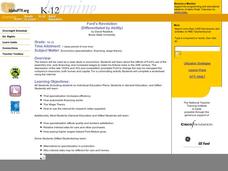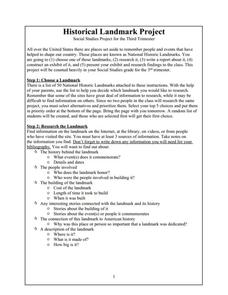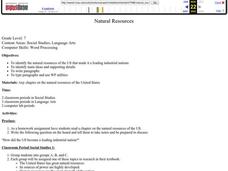Curated OER
The Geography of China
Viewers will love this field trip to China, complete with information about China's economy, topography, geography, climate, and demographics. Maps and photos help to support the claims in the slides, especially in some interesting...
Curated OER
Fascism Rises in Europe: Ch 31
Help your class understand how Hitler achieved power prior to World War II. A strong presentation outlines the post-World War I social and economic context that primed Eastern Europe for a totalitarian dictator. It presents the...
Curated OER
Ford's Revolution
Industrialization and mechanization of products such as cars have deeply affected the US economy. The class discusses the affects of Ford's assembly line production of automobiles. They watch a video, fill out worksheets, and investigate...
Smithsonian Institution
We Have a Story to Tell: Native Peoples of the Chesapeake Region
How did colonial settlement and the establishment of the United States affect Native Americans in the Chesapeake region? Your young historians will analyze contemporary and historical maps, read informational texts, and work in groups to...
Japan Society
Changing Times, Changing Styles: New Japanese Literary Styles of the Late Nineteenth Century
Focusing on Doppo's "Unforgettable People" and late nineteenth century Japanese literature, this resource also leads to discussions of form being dictated by content. Explore the development of new literary styles first-hand by...
Rutgers University
How the Allies Won World War II: Island-hopping in the Central Pacific
Using primary source documents, young historians explore the strategies the US used to defeat Japan during WWII. They also learn about the American military experience, and innovations that changed the style of warfare. Students benefit...
Shmoop
ELA.CCSS.ELA-Literacy.SL.11-12.3
Dr. Martin Luther King Jr.'s speech, "I Have a Dream," is one of the most famous in United States history, but why was it so effective? Ask your class to determine the answer to this question. While the resource includes a description of...
The New York Times
Decision Point: Understanding the U.S.’s Dilemma Over North Korea
Simulate the Situation Room and analyze the US's relationship with North Korea. The plan starts off with a quick review and an examination of a online timeline that updates as the situation continues. Next, the class reads an article and...
Azusa Pacific University
Historical Landmark Project
Close a unit or the year with a five-step research project. Class members choose a US landmark, research the landmark, compose a report about it, build a model of it, and present their model and findings to the class. Each step is...
Humanities Texas
Primary Source Worksheet: Letter from George Washington to the Cabinet
Analyze the significance of George Washington's letter to his cabinet in which he sets forth a tradition of neutrality in wartime for the United States.
National Endowment for the Humanities
Albert Sabin and Bioethics: Testing at the Chillicothe Federal Reformatory
Do the ends justify the means? Getting a drug approved in the US is a long and involved process. But at some point out, it involves testing on humans. The ethics of such testing is the focus of a resource that uses Dr. Albert Sabin's...
Museum of Tolerance
Oral History Activity
Oral history has brought a multitude of lessons, stories, and factoids to our current knowledge of the past. Let us continue to use oral history traditions through a lesson that encourages pupils to discover and appreciate where they...
Classroom Law Project
Who are the major candidates and where do they stand?
Who were the candidates in the 2008 US Presidential election and where did they stand on important issues? Use a resource that offers an opportunity to go back in time and examine candidates and issues involved in that election year.
Edible Schoolyard
Pan de los Muertos
Accompany instruction and the celebration of El Dia de los Muertos with a loaf of Pan de los Muertos. Here, scholars measure ingredients precisely to create tasty bread, write a remembrance for someone who has passed away, and take part...
Stanford University
Lesson Plan: Montgomery Bus Boycott
Most of us have heard of Rosa Parks, the Montgomery Bus Boycott, and Martin Luther King, Jr. But what about Claudette Colvin, Virginia Durr, Freedom Summer, or the Birmingham Children's Crusade? A five-lesson unit prompts class members...
Constitutional Rights Foundation
Conservation, Preservation, and the National Parks
Going green? Scholars investigate the creation of the US National Park program. Through diary entries as well as expert testimony, they synthesize information and analyze the need for conservation and preservation. Finally, they display...
US National Archives
WWII: The Pacific 1939-45 – Pearl Harbor
Though December 7th, 1941 was a day "which would live in infamy," World War II had provided many infamous days, events, battles, and atrocities in the years before. So why were American forces so surprised when Japan attacked Pearl...
Curated OER
Cultural Lit. 30: The Constitution & Native Americans
Students identify and consider United States Constitutional origins in American Indian culture.
Curated OER
Natural Resources
Seventh graders consider how US natural resources have helped it to become a leading industrialized power. They research, discuss, write and edit an expository paragraph in groups. They can present paragraph to another class or compile a...
Curated OER
The U.S. & Navajo Bills of Rights
Middle schoolers are introduced to the United States and Navajo Bill of Rights. In groups, they compare and contrast the two documents and take notes to share with the class. To end the lesson, they write in their journals about their...
Curated OER
Preventing Lead Poisoning in Children
Students examine the problem of children being poisoned by lead in the United States. After discussing the uses of lead, they brainstorm a list of ways they can be poisoned by the substance. In groups, they discover how they can stay...
Curated OER
Colonial Flag
Students examine the reasons for and the results of the US Revolutionary War. They watch a PowerPoint presentation to review the immediate results of the war. They design a flag for the newly free colonies.
Curated OER
Presidential Power and Influence
Middle schoolers analyze the powers and duties that Article II of the US Constitution grants the President. They determine the influence the President has on the nation and how philanthropy changes in a nation.
Curated OER
Symbols of Freedom
Students investigate symbols of the United States in this unit. They exam the Liberty Bell, the American Flag, the President, and the Bald Eagle.
Other popular searches
- Us States and Capitals
- Southeast Us States
- Us States Map
- Us States Projects
- Us States Midwest
- Us States Geography
- Learn the Us States
- Us States and Midwest
- Us States Reports
- Us States Capitals
- Us States and Capitols
- Southeastern Us States

























